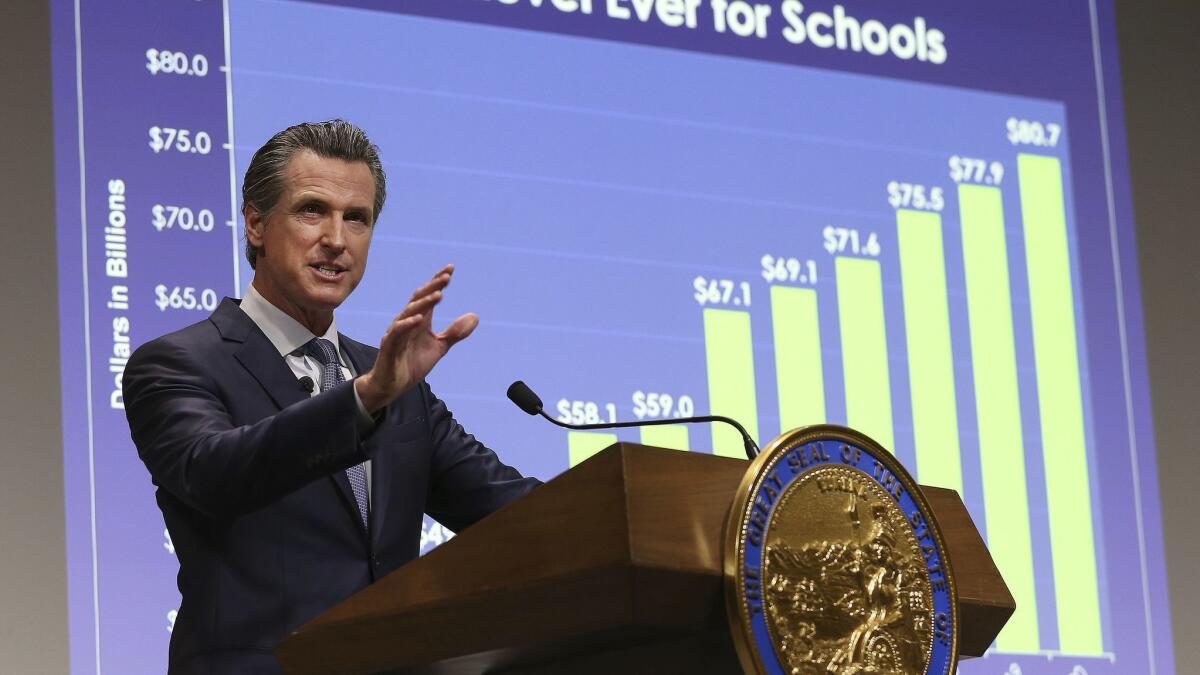Federal tax changes could be why California’s budget is more than $2 billion below projections

- Share via
Reporting from Sacramento — Gov. Gavin Newsom’s hopes for a record-setting tax revenue windfall this year could depend on whether California’s wealthiest residents are simply waiting until the last moment to pay up — a reaction to the 2017 federal tax changes championed by President Trump.
State financial experts on Tuesday reported fiscal year-to-date revenue is more than $2.3 billion below the expectations set by Newsom’s first spending plan. But they believe the money is simply delayed, not missing.
“We don’t think it reflects any underlying weakness in the economy,” said H.D. Palmer, a spokesman for the California Department of Finance.
Instead, what state economists are now projecting is the state’s first and most significant ripple effect from the tax overhaul written by Republicans in Congress and signed into law by Trump in December 2017. The sweeping law, among other things, cut the total amount of state and local taxes that can be deducted from what’s paid to the federal government. Where Californians once wrote off an average of $22,000 in these taxes, the new law caps the deduction at $10,000.
The one-day, $1-billion California budget gimmick that has lasted for almost a decade »
Wealthy taxpayers who used to pay their estimated state tax bill in December — and were able to tuck an additional deduction into that year’s federal return — no longer have an incentive to pay early. Palmer said state economists believe that’s why what may appear to be a drop in budget revenue may be only an issue of timing.
“We caution against building a long-term trend off one month’s data,” he said.
But determining how long those high-income earners will hold onto the money they owe in California income taxes could be a challenge. Initially, state officials said the payments would be made in January and Newsom’s budget plan relied on that assumption. Tuesday’s report showed the wait for the money will last longer — their initial effort to predict the timing of the payments resulted in a projection $2.8 billion too high.
Palmer said wealthy taxpayers could simply hold onto the money and earn interest on it through April 15, the final day to pay taxes on revenue earned in 2018.
Newsom has proposed using most of the tax windfall for one-time infusions of cash into education and efforts to help California’s neediest residents. That includes a $1-billion tax credit for low-income workers and a $500-million effort to combat the state’s homelessness crisis.
In all, the governor’s budget plan assumes $21.6 billion in unrestricted excess cash, on top of more than $15 billion set aside in the official “rainy day” reserve fund. Lawmakers will begin digging into the details of Newsom’s plan in the next few weeks, before sending him a final spending plan by June 15.
Follow @johnmyers on Twitter, sign up for our daily Essential Politics newsletter and listen to the weekly California Politics Podcast
More to Read
Get the L.A. Times Politics newsletter
Deeply reported insights into legislation, politics and policy from Sacramento, Washington and beyond. In your inbox twice per week.
You may occasionally receive promotional content from the Los Angeles Times.











